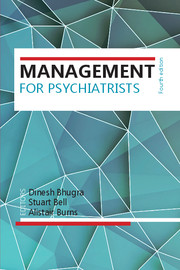Book contents
- Frontmatter
- Contents
- List of contributors
- List of figures, tables and boxes
- Preface
- Part I Theoretical overview
- 1 History and structure of the National Health Service
- 2 The politics, funding and resources of the NHS in England
- 3 Medical management
- 4 Doctors and managers
- 5 Resources in the NHS
- 6 The development of community care policies in England
- 7 Psychiatry management and legislation in Northern Ireland
- 8 Mental health services in Scotland
- 9 Mental health services in Wales: policy, legislation and governance
- 10 The Mental Capacity Act–an update
- Part II Changes and conflicts
- Part III Personal development
- Index
10 - The Mental Capacity Act–an update
from Part I - Theoretical overview
Published online by Cambridge University Press: 02 January 2018
- Frontmatter
- Contents
- List of contributors
- List of figures, tables and boxes
- Preface
- Part I Theoretical overview
- 1 History and structure of the National Health Service
- 2 The politics, funding and resources of the NHS in England
- 3 Medical management
- 4 Doctors and managers
- 5 Resources in the NHS
- 6 The development of community care policies in England
- 7 Psychiatry management and legislation in Northern Ireland
- 8 Mental health services in Scotland
- 9 Mental health services in Wales: policy, legislation and governance
- 10 The Mental Capacity Act–an update
- Part II Changes and conflicts
- Part III Personal development
- Index
Summary
Since the last edition of this book was published in 2007 there have been many developments in the way the Mental Capacity Act 2005 (MCA) is used in England and Wales. This chapter will consider the recent postlegislative scrutiny of the Act by a Select Committee of the House of Lords, together with some of the most significant case law affecting the interpretation of the Act. The 2006 United Nations (UN) Convention on the Rights of People with Disabilities may also have a significant impact on mental health law (Kelly, 2014).
The MCA is not generally popular with health professionals. It is a subject which demands mandatory retraining. It appears to many to have created barriers which impede the smooth delivery of care and to have caused rifts between patients and families, doctors and social workers. It even sometimes brings lawyers into clinical situations. There was a period between the Mental Health Act 1983 (MHA) coming into force and the implementation of the Mental Capacity Act (MCA), in 2007, when there was no statute law on incapacity, but this was not a golden era and decisionmaking was even trickier then.
The MCA has been subject to a comprehensive review by a Select Committee of the House of Lords. The Committee felt (House of Lords, 2014) that the Act was well drafted and still relevant, but that it was not being used as it was intended. It had not become ‘embedded’ in practice. The Committee found that despite the Act, professional practice had not changed; doctors were still acting paternalistically and social workers used the Act to maintain their customary aversion to risk. The Committee did acknowledge (para. 128) that alone among the medical Royal Colleges, the Royal College of Psychiatrists regarded the Act as a priority. The Committee concluded that the principles of the Act to maximise autonomy and support decision-making by people with intellectual and cognitive impairments were not being put into practice.
The UN Convention also lays stress on the importance of supporting people with disabilities to make their own decisions. The UN Committee on the Rights of Persons with Disabilities (2013) recommended that governments should take active steps to phase out substitute decisionmakers (such as deputies and attorneys) and replace them with a system of supported decision-making.
- Type
- Chapter
- Information
- Management for Psychiatrists , pp. 131 - 138Publisher: Royal College of PsychiatristsPrint publication year: 2016



